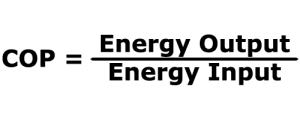If you’ve ever dabbled into the world of pool heaters, then it’s likely you’ve heard the term COP or Coefficient of Performance tossed around in the past. Believe it or not, a COP is an especially important factor to consider when purchasing a pool heater. As a matter of fact, it directly correlates to the level of performance and energy efficiency you can expect from a unit. Here’s how:
What is a Coefficient of Performance?
All pool heaters require a simple and easily identifiable way to gauge their performance in terms of energy use. This is where a coefficient of performance comes into play. A COP is a ratio that measures the amount of energy a heating/cooling appliance outputs to the amount it consumes. The formula for calculating a unit’s COP looks like this:
COPs, Energy Efficiency, and Heating Costs
At this point, you might still be wondering how exactly a COP correlates to energy efficiency, and moreover, how high the electricity bill is at the end of the month. Luckily this correlation is one particularly easy to explain and understand.
Typically, the higher a pool heater’s COP, the more energy efficient it is. For example, if a pool heat pump has a COP of 6, then that means for every unit of energy it consumes, 6 units are produced. Gas and electric resistance pool heaters tend to have the lowest COPS while those of pool heat pumps and solar heaters are much higher. Investing in an energy-efficient pool heater means a lower electricity bill at the end of the month. You can learn more about the differences in cost and performance between the major pool heater types here.
You should now have a thorough understanding of what exactly a Coefficient of Performance is and how it affects your monthly operation costs. If you have additional questions about COPs or pool heating in general, feel free to leave a comment below, or contact us directly.


